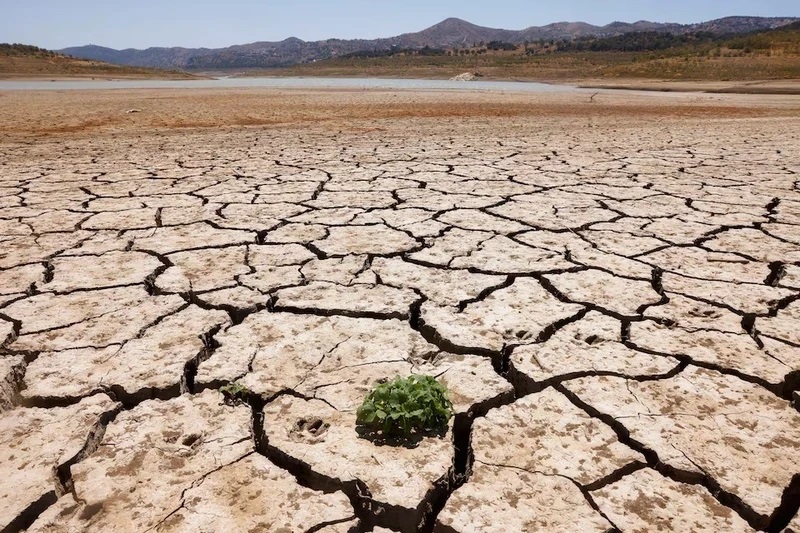The United Nations Climate Change Conference in Bonn, Germany, has just ended without any major breakthroughs. Once again, the conference exposed the rifts among the world's largest economies over the cost and funding of the long-term and arduous fight against climate change, that are unlikely to be healed anytime soon.

A plant sprouts between the cracked ground of La Vinuela reservoir during a severe drought in La Vinuela, near Malaga, southern Spain on August 8, 2022. (Photo: Reuters)
There are only five months to go until the 29th Conference of the Parties to the UN United Nations Framework Convention on Climate Change (UNFCC COP29), but the countries remain divided on several issues, including the scale of global funding to help developing countries combat climate change.
Although the new climate finance target will be one of the key issues for countries to agree on at COP29, scheduled to take place in Baku, Azerbaijan in November, preliminary negotiations at the UN Climate Consultative Conference, officially known as the 60th Session of the Subsidiary Body for Scientific and Technological Advice and the Subsidiary Body for Implementation (SB 60), failed to make any major breakthroughs. Not only that, the conference continued to expose unhealed rifts among the world’s largest economies, over who should spend the most money and how much to fight climate change.
Speaking at the closing ceremony, Executive Secretary of the UNFCCC Simon Stiell, assessed that the conference had only achieved modest steps forward and many issues remained controversial, as only a short time remains before COP29. He stressed: “We took a detour on the road to Baku”, with many knots still unsolved. In particular, the most prominent issue is climate finance, or how rich countries support developing countries to implement measures to adapt to climate change and transition to clean energy.
In 2009, developed countries agreed to contribute 100 billion USD per year to help poor countries invest in clean energy and cope with the increasingly severe impacts of climate change. After more than a decade, rich countries finally reached this target for the first time in 2022, with 115.9 billion USD. The majority of this amount was disbursed in 2022 for climate action to limit greenhouse gas emissions and improve clean energy and transport. However, the Organisation for Economic Cooperation and Development (OECD) complained that rich countries were “reaching the finish line” two years behind their commitment, causing frustration and distrust among poor countries, which are in dire need of money to fight climate change.
The 100 billion USD annual contribution is set to expire in 2025, so the countries need to agree on a new target at COP29. However, disagreements over how much money to raise, who will pay and who will receive it, and what form the funding will take, have been stumbling blocks in the more than 10-day talks in Bonn. Developing countries, excluding China, estimated that at least 2.4 trillion USD will be needed to tackle climate change by 2030. They have called for more grants and fewer loans in the next phase, while some rich countries want emerging markets like China to also make contributions toward financing climate initiatives.
Meanwhile, Brazilian Deputy Minister of Economy Cristina Reis, warned that extreme weather events caused by climate change are becoming a growing threat to the global economy, especially developing countries that are vulnerable to natural disasters. Storms, floods and droughts have often caused severe damage to infrastructure, financial security and supply chains; increased agricultural production costs; and increased inequality in the world. Reis called on countries to work together to shift to economic activities aimed at preserving, protecting and regenerating ecosystems
Executive Secretary of the UNFCCC Simon Stiell, said that for governments to have a chance to sign an agreement in November, the countries should make clear and substantive choices in the draft. The UN official urged all sides to make efforts to narrow their differences, as it is unlikely that a comprehensive political solution will be found at the last minute in Baku. He also warned that negotiators will have a difficult road ahead to achieve the desired results.
Yen Linh - Translated by NDO